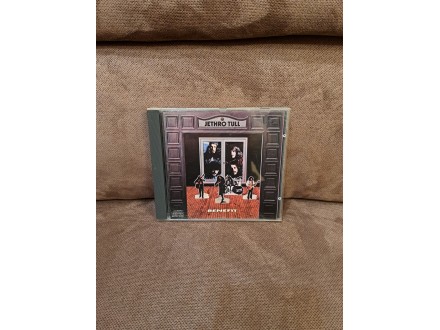Jethro Tull - Benefit
| Cena: |
| Želi ovaj predmet: | 1 |
| Stanje: | Polovan bez oštećenja |
| Garancija: | Ne |
| Isporuka: | CC paket (Pošta) Post Express Lično preuzimanje |
| Plaćanje: | Tekući račun (pre slanja) Lično |
| Grad: |
Novi Sad, Novi Sad |
Izdavač: Ostalo
Žanr: Hard Rok i Metal, Rok
Poreklo: Strani izvođač
Original, made in UK
Knjizica od 4 str.
Odlicno ocuvano
knjizica 5- Cd 5-
Studio album by Jethro Tull
Released 20 April 1970
Recorded 3 September 1969 – 25 February 1970
Studio Morgan Studios, London
Genre
Hard rockfolk rockprogressive rock
Length 42:00
Label Chrysalis/Island (Europe)
Reprise (America, Japan and Oceania)
Producer Ian Anderson, Terry Ellis
Jethro Tull chronology
Stand Up
(1969) Benefit
(1970) Aqualung
(1971)
Benefit is the third studio album by the British rock band Jethro Tull, released in April 1970. It was the first Tull album to include pianist and organist John Evan – though he was not yet considered a permanent member of the group – and the last to include bass guitarist Glenn Cornick, who was fired from the band upon completion of touring for the album. It was recorded at Morgan Studios, the same studio where the band recorded its previous album Stand Up; however, they experimented with more advanced recording techniques.[2]
Frontman Ian Anderson said that he considers Benefit to be a much darker album than Stand Up, owing to the pressures of an extensive U.S. tour and frustration with the music business.[3]
Production
Guitarist Martin Barre said that Benefit was a lot easier to make than previous albums, as the success of Stand Up allowed the musicians more artistic latitude.[4]
Bassist Glenn Cornick stated that the band`s intention was to capture a more `live` feeling as `I felt the last one sounded like a group of session musicians performing various songs. It was pretty cold.`[5]
Benefit incorporated studio techniques such as reverse recording (flute and piano tracks on `With You There to Help Me`), and manipulating the tape speed (guitar on `Play in Time`). In a 1970 interview Anderson noted that the addition of keyboardist John Evan had changed the band`s style: `John has added a new dimension musically and I can write more freely now. In fact anything is possible with him at the keyboard`.[6]
Musical style
Ian Anderson said that Benefit was a `guitar riff` album, recorded in a year in which artists like Cream, Jimi Hendrix and Led Zeppelin were becoming more riff-oriented. Anderson also noted that Benefit is `a rather dark and stark album and, although it has a few songs on it that are rather okay, I don`t think it has the breadth, variety or detail that Stand Up has. But it was an evolution in terms of the band playing as `a band." Overall, Anderson considered the album `a natural part of the group`s evolution`.[7]
According to Martin Barre `To Cry You a Song` was a response to Blind Faith`s `Had to Cry Today`, `although you couldn`t compare the two; nothing was stolen ... The riff crossed over the bar in a couple of places and Ian and I each played guitars on the backing tracks. It was more or less live in the studio with a couple of overdubs and a solo. Ian played my Gibson SG and I played a Les Paul on it.`[
ll music is composed by Ian Anderson
Side one
No. Title Length
1. `With You There to Help Me` 6:20
2. `Nothing to Say` 5:10
3. `Alive and Well and Living In` 2:47
4. `Son` 2:52
5. `For Michael Collins, Jeffrey and Me` 3:59
Side two
No. Title Length
6. `To Cry You a Song` 6:09
7. `A Time for Everything?` 2:43
8. `Inside` 3:40
9. `Play in Time` 3:45
10. `Sossity; You`re a Woman` 4:35
Personnel
Jethro Tull
Ian Anderson – vocals, acoustic guitar, electric guitar (uncredited), flute, balalaika, keyboards, production
Martin Barre – electric guitar
Glenn Cornick – bass guitar, Hammond organ (uncredited)
Clive Bunker – drums, percussion
Additional musicians
Dee Palmer – orchestral arrangements
John Evan – piano, organ
Production
Robin Black – engineer
Terry Ellis – cover design, executive producer
Ruan O`Lochlainn – cover design, photography
Predmet šaljem nakon uplate na moj tekući račun ili po dogovoru.
Lično preuzimanje je uvek moguce u Novom Sadu po dogovoru,ili na mojoj adresi .
Molim kupce da pre licitacije pitaju sve sto ih zanima, kako bi izbegli eventualne nesporazume.
U slučaju bilo kakvog problema nakon preuzimanja paketa, kontaktirajte me pre davanja ocene kako bi isti pokusali da rešimo.
Ne šaljem pouzećem.
Za prodaju cd-ova : Plastične kutije su zamenjive i njih NE OCENJUJEM! Takodje zadnja strana iza plastike drzaca cd je vidljiva slika, za njih isto ne ide ocena, sve se vidi!
Predmet: 77217869











